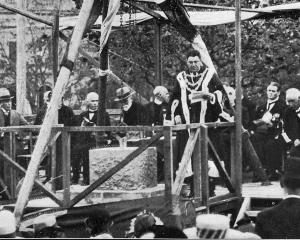It is an open secret that many of the Territorials have decided to grow beards in camp, and it remains to be seen whether they will be able to carry their fashion out. The matter has cropped up owing to an order that Territorials shall take shaving material into camp.
There will be no camp barber, and each man will have to make his own toilet; but it is pointed out that the defence authorities cannot compel a man to take into camp any private possession, even a razor or a shaving brush.
If the authorities want their men shaven they should provide appliances and means to that end.
The officers profess to believe that by the defence regulations, which provide that a man shall appear neat and orderly on parade, they can compel the men to shave; but it is not so long ago that a peremptory sergeant-major ordered an Auckland Territorial to get his hair cut. The officer soon learned, however, that he had exceeded his jurisdiction, and the northern newspapers were flood with correspondence in connection with the case.
• A case of much interest to school teachers was concluded at the Wanganui Magistrate's Court to-day, when the first assistant at the Wanganui East School was charged with assaulting a 10-year-old boy.
It was alleged that owing to the boy's inability to do sums which had been taught while he was in the hospital undergoing an operation he was thrown on the floor by the teacher and severely thrashed, bruises being apparent for some time.
The defence was that the punishment was for insolence and insubordination and was not excessive.
The teacher had put the boy over his knees and administered six strokes with a strap, when the boy, who was resisting, wriggled on to the floor, where he received three more strokes.
The Magistrate, in dismissing the information, held that the punishment was merited and was not excessive.
• The first mutton birds of the season arrived at Bluff by the Rakiura on Monday (says the Southland Times). The birds are in good condition. Reports that have trickled through regarding the mutton-birders are to the effect that this year gives promise of a record yield.
Thanks to the dry weather, every mutton bird burrow has an inhabitant, there having been no birds flooded out as in former years. As a matter of fact, during the early part of the season the mutton-birders were on short supply so far as water was concerned.
The ''passage'' birds have now been dealt with, and the ''mid-passage'' crop is being reaped. The season will last another month at least.
• ''The day is not far distant,'' remarked the Mayor of Auckland (Mr C. J. Parr), when welcoming delegates who attended the Coachbuilders' Conference ''when vehicular traffic in the large cities will be confined to the motor. The horse is passing away.
''In the last few years I have noticed a marked decline in the number of horse-driven vehicles.
''We will see during our lifetime a departure of the horse as a medium of traffic, and the City Council, anticipating this, has energetically moved in the direction of laying down permanent streets to prepared for the motor traffic.
''Much as we love the horse, he has to go.''
- ODT, 21.4.1914.












